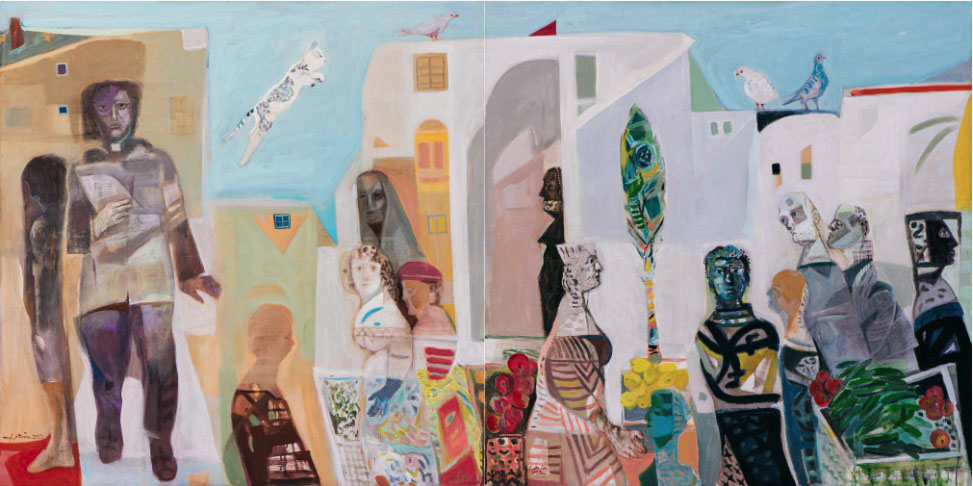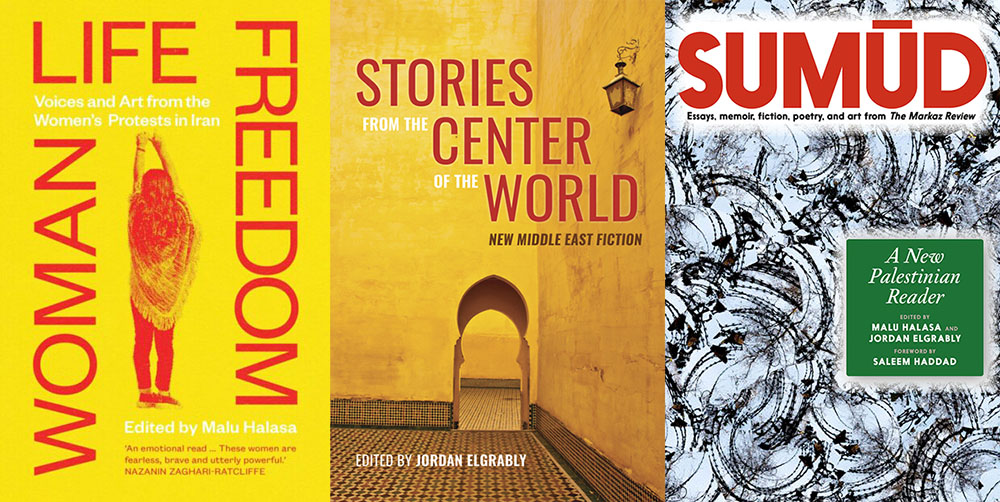The Markaz Review (TMR) is an online and print review of art, music, film, literature, ideas, cities and culture writ large, with an emphasis on freedom of expression and a focus on the writers and artists from the center of the world. Organized as a nonprofit in France and the United States, TMR supports creative people of the greater Middle East, generally thought to include the Arab world, Iran, Turkey, Afghanistan, Pakistan and North Africa. As a global community, TMR is a creative and literary destination that seeks to erase the boundaries between peoples and celebrate culture.
The Markaz Review publishes in English, and in Arabic, French & Spanish translation.
We publish 10 monthly themed issues per year (July/August and December/January are double issues) on the first Friday of the month. We also publish new essays, stories and other content every Friday, except on the publication days of our monthly issues.
Every month in Poetry Markaz, we publish two international poets, who speak about their work on video.
While the majority of our content is free, member-subscribers, who are the backbone of TMR, have access to PDF issues and flipbooks, which are available for all of our past issues. They will also receive, beginning in September 2024, our new annual “best of” print review. In addition, editors of The Markaz Review curate anthologies, such as Woman Life Freedom: Voices and Art from the Women’s Protest in Iran, edited by Malu Halasa (Saqi Books 2023); Stories from the Center of the World: New Middle East Fiction, edited by Jordan Elgrably (City Lights 2024); and Sumūd: A New Palestinian Reader, edited by Malu Halasa and Jordan Elgrably (Seven Stories Press 2024).
In 2020, The New York Times published a damning report that showed that the vast majority of the literature published in the United States since 1950 has been by white writers: “Of the 7,124 books for which we identified the author’s race,” the authors wrote, “95 percent were written by white people.” In addition, the last time we checked, only about 3% of the literature published in the US consists of translations. To compare, as of 2019 one of six books published in France were translations—roughly 15%.
Founded in 2020, The Markaz Review (TMR) has become the leading multilingual online publication for cultural news from the Middle East and North Africa. Its aim is to provide a better understanding of the region, as well as of its diaspora communities, in France, Europe, and throughout the world.
In a world increasingly fragmented by all forms of racism and discrimination, TMR’s mission is to promote, through the arts and ideas, a culture of human rights and freedom of expression.
Via the publication of essays, fiction, poetry and reviews, and the organization of various programs and events, we promote poets, writers and artists aligned with TMR’s values, beyond Eurocentric borders. Taking the center of the world (North Africa and the Middle East) as our point of departure, TMR is an international review of positive inquiry and critique, as well as a space for dialogue at the intersection of the arts and humanities.
TMR is rooted in the erstwhile Levantine Cultural Center in the United States. Founded in Los Angeles in the summer of 2001, the center gave voice to Middle Eastern and North African communities living in the United States, who were severely under-represented in the cultural, artistic and literary sectors. The center’s mission was to offer alternative narratives about the Middle East, North Africa and its communities, and to create bridges and dialogue between the different cultures in the United States. The center was later renamed “The Markaz,” meaning the center in Arabic, Persian, Hebrew, Turkish and Urdu.
Our DNA
The name “Markaz” underscores the cultural, ethnic, linguistic, and religious diversity of the region. Throughout the years, the artistic and literary programs presented by The Markaz have succeeded in bringing people together, overcoming biases, and fostering self-understanding and mutual comprehension. Regrettably, the Covid crisis resulted in the closure of The Markaz center. Nonetheless, its mission has persevered through the establishment of The Markaz Review, enabling artists, writers, and poets to persist in having an outlet for expression and discourse, albeit in an online format.
In 2021, a new chapter began when TMR created a nonprofit association on the shores of the Mediterranean, in Montpellier. In addition to being a fiscally-sponsored project in the US, the review operates as a French association under the regulations of the law passed on July 1st, 1901, and the magazine aspires to carve its place in the French media, literary, and artistic scene. This new Euro-Mediterranean endeavor grants TMR a foothold on the northern Mediterranean, where the historical ties with the MENA region are indisputable. Through this journey, TMR celebrates the cultural and linguistic diversity of the Mediterranean. Our ambition is to create a community of readers with a keen interest in cultural matters in our beloved region. In the summer of 2023, TMR established new offices and an exhibition space at 7 rue de Verdun, Montpellier. For us, the choice of Montpellier was an obvious one, as the city is renowned for its vibrant cultural scene and its Mediterranean-oriented cultural offerings such as the Festival Arabesque and Cinemed. The prospect of contributing to the city’s cultural dynamism and meeting the expectations of a public growing more eager for cultural pluralism is a particular thrill.
TMR consistently publishes Arab, Iranian and other artists and writers from beyond the Eurocentric pale. We translate from Arabic, Persian, Turkish, French and Spanish. And so the purpose and value of The Markaz Review becomes evident: rather than being akin to the missionaries of yore who brought the Gospel to the world’s perceived backwaters, TMR brings the rest of the world to European and American shores — or at least the Arab/Muslim world, which includes parts of Africa and Asia.
The Markaz Review or TMR is published in partnership or with the support of a number of foundations and organizations, listed here. We are a nonprofit organization dedicated to promoting and disseminating rigorous, incisive, and engaging writing on every aspect of literature, culture, and the arts.
TMR exists by the sheer grace of our supporters. Thanks for reading, sharing and supporting TMR.
Sharing Our Stories
Sharing our stories, our arts and culture, our history, and our aspirations for a more peaceful, just world, we come together in dialogue. But we are under no illusions—the reality today is that there is far too much anti-refugee, anti-immigrant, anti-Arab and anti-Muslim sentiment. Xenophobia, antisemitism and racism in Europe and the United States are rampant. TMR is a place to mitigate this negative void and fill it by educating people worldwide, to prevail in the search for creative, intellectual and spiritual evolution.
Our Approach
Markaz programs served the interests of rapprochement and peer-to-peer diplomacy by welcoming people of every nation and religion, erasing the boundaries between peoples.


